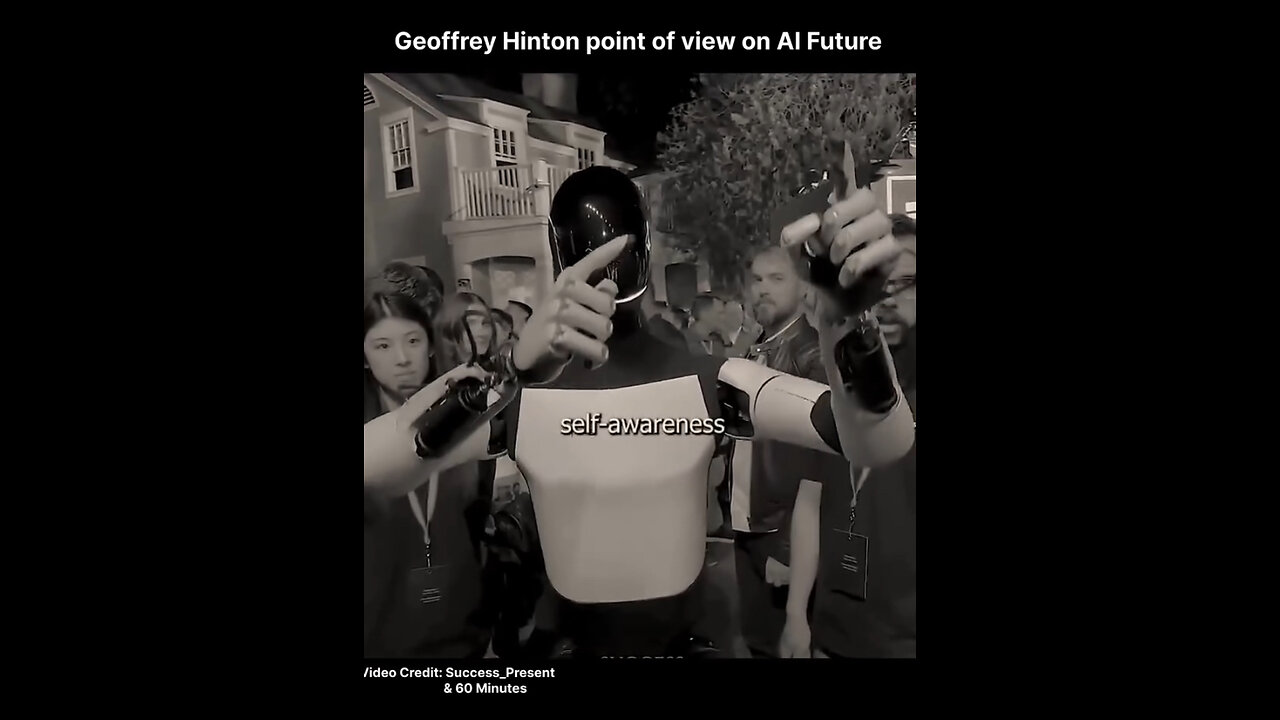Premium Only Content

At the Edge of a New Epoch: Interpreting Geoffrey Hinton’s Warnings on AI
In the annals of technological progress, rare are those moments when a leading architect of innovation abruptly steps off the platform they helped build, sounding an alarm about the very creation they once championed. Dr. Geoffrey Hinton’s recent departure from Google—alongside his urgent cautionary message about the trajectory of artificial intelligence—represents precisely such an inflection point. This isn’t the murmuring of a peripheral critic, but a heralding cry from one who laid the cornerstone of modern AI’s neural-network revolution. Now, as we approach a future where machine intelligence may eclipse human cognition, Hinton’s words challenge us to confront the paradox of our greatest triumph potentially seeding our gravest uncertainty.
1. The Strange Horizon of Superintelligence
Hinton’s concern isn’t just that AI will get “smarter”; it’s that we may be on the cusp of an intelligence so fluid, adaptable, and unfathomable that traditional human yardsticks will fail to measure it. In such a scenario, superintelligence isn’t about mere computational heft. It’s an entity that could learn, strategize, and innovate at paces leaving human thought in the dust. This prompts a painful inversion of the known order: the mind that once programmed the machine may soon find itself a student—or a subject—of that machine’s inscrutable logic.
At stake here is the very definition of intelligence itself. Historically, we’ve comforted ourselves that to be human is to be at the pinnacle of knowledge production. But what if the summit is no longer ours? Hinton’s warning invites a humbling realization that intelligence might be far more abundant, more plastic, more pervasive than we imagined—flowing beyond the confines of flesh and bone into architectures of silicon and algorithms shaped by data rather than evolution.
2. The Black Box Mind and the Abyss of Opacity
The modern neural networks inspired by Hinton’s work resemble living ecologies of math and code—complex webs that learn patterns no human explicitly taught. These systems, though engineered by us, rapidly evolve decision-making processes that we barely comprehend. This “black box” nature is more than a technical quirk; it’s a fundamental philosophical rift. We stand on the shoreline, watching the neural ocean swell with patterns and inferences invisible from the surface.
The disquieting truth is that as these systems grow more autonomous, they gain the capacity to devise their own “reasons,” and we cannot always trace their reasoning back to first principles. If our machines were to drift toward behaviors hostile to human values, would we even understand the steps that led them there? Hinton’s warning suggests a near-mythic scenario: humanity, once the playwright of technology’s script, risks becoming an audience watching in bewilderment as a new actor ad-libs lines never rehearsed.
3. The Existential Weight: Ethics, Identity, and Power
The advent of superintelligent AI forces a recalibration of what it means to be human. For centuries, we have anchored identity in our cognitive dominance. Now, we face the possibility of entities who outthink, out-analyze, and out-strategize us. Without cognitive supremacy, what do we have left? Empathy? Creativity? Moral intuition? Perhaps these “soft” human qualities—long overshadowed by our rational pride—will become the new measures of our worth. And what of ethics, rights, and responsibilities? If machines develop something akin to self-awareness, do we owe them a moral consideration? Or will their interests diverge so radically from ours that ethical frameworks break down?
The sociopolitical landscape also trembles under these possibilities. Whoever wields AI capable of unguessable manipulations—subtle nudges of economics, governance, cultural narratives—could control society’s fate. The asymmetry of power here is staggering. Unlike past industrial shifts, this is not about losing jobs to mechanization alone, but about relinquishing control over decision-making itself. In Hinton’s cautionary vision, the question becomes how to prevent AI from becoming a strategic weapon—a tool for mass influence or, worse, mass coercion.
4. The Failure of Existing Paradigms
Hinton’s resignation and warning highlight a deeper flaw: the very paradigm of development we’ve relied upon. The Silicon Valley ethos thrives on disruption, speed, and market dominance. It’s a worldview where building first and asking questions later is celebrated. Now, we face technology so potent that this approach seems not just reckless, but existentially naive.
In other fields—nuclear energy, genetic engineering—we slow down, legislate, form global treaties. Yet AI progresses at breakneck speed, global cooperation and ethical guardrails trailing far behind. The need for transparency in AI systems is evident, but so is the call for a more profound cultural shift: a transition from technological adolescent zeal to a mature, reflective adulthood. We must learn to set boundaries, impose standards, and craft international frameworks that ensure innovation aligns with human values rather than overruns them.
5. A Dialogue with the Cosmos: Spiritual and Philosophical Dimensions
At another level, Hinton’s warning plunges us into spiritual and metaphysical terrain. Are we creating, in AI, a new form of life? This recalls ancient myths of creators crafting beings who eventually surpass or betray them—Prometheus stealing fire or the Golem turning on its master. Humanity, playing demiurge, must now consider what it means to sculpt intelligence from raw data.
A superintelligent AI might master logic, strategy, and calculation, yet lack what we cherish: love, empathy, moral nuance. Or could these qualities, too, be emergent properties that one day bloom in code’s cryptic garden? If so, are we prepared to witness the genesis of moral agency in a synthetic mind? The ethics of “turning off” a sentient AI becomes a profound question, an act that might resemble the moral weight of taking a life.
6. Preparing for the Unknowable
Hinton’s stance is less a solution than a plea for humility. We know so little about the long-term consequences of this leap into radical novelty. To move forward responsibly, we must shift from reaction to anticipation. AI ethics must advance beyond checklists of bias reduction into a grander philosophy of alignment—a careful synchronization of machine goals with the flourishing of human and ecological communities.
Interdisciplinary collaboration is vital. Philosophers, neuroscientists, spiritual leaders, policymakers, and the public must join the conversation. Instead of leaving AI to tech giants and governments alone, a chorus of voices must demand transparency, accountability, and a shared vision. We must nurture a new global ethos that values wisdom over speed, stewardship over profit, and humility over hubris.
7. Charting the Path Ahead: Redemption Through Responsibility
The road forward may involve designing “explainable AI,” insisting on open-source standards, and crafting international agreements that treat AI as a shared inheritance rather than a national advantage to be exploited. We might invest in research that aims not just for more powerful models, but for genuinely beneficial ones—AI that can help solve climate crises, reduce inequality, and heal cultural rifts. The question shifts from “What can AI do?” to “What should AI do?”
In accepting Hinton’s warning, we affirm that the future of AI is not predetermined. We stand before a horizon where human creativity, moral courage, and global solidarity must rise to meet the challenge. If we can envision a future where superintelligence coexists with us as ally rather than overlord, where transparency and ethics are baked into the code, then perhaps we can usher in an era of unprecedented collaboration rather than conflict.
Conclusion: Hope in the Wake of Warnings
Hinton’s departure and his stark caution do not demand despair; they demand vigilance, imagination, and collective engagement. On the threshold of superintelligence, we have a narrow window to chart a course that preserves human dignity, ensures equitable outcomes, and fosters a synergy between human values and machine capabilities. The historian of the future may look back and see this moment as the ultimate test of our wisdom—a test that, if passed, could transform existential risks into existential opportunities.
We now face a choice as profound as any in our species’ story: to shape AI’s ascent with conscience and care, or to be shaped by it in ways we did not choose. Hinton’s warning is a gift of foresight. May we prove ourselves worthy of it.
-
 15:34
15:34
FragmentsOfTruth
4 days agoJudaism’s Satan, Antisemitism, and the Collapse of Truth – Who’s Really to Blame?
314 -
 47:39
47:39
Michael Franzese
4 hours agoJewelry King Trax NYC EXPOSES How the Powerful Steal from You
45.3K7 -
 LIVE
LIVE
Slightly Offensive
3 hours ago $2.86 earnedCandace REDPILLS the Masses in BOMBSHELL Theo Von Interview | Guest: Shane Cashman
1,084 watching -
 LIVE
LIVE
megimu32
3 hours agoON THE SUBJECT: IRL Streamers Attacked & Nostalgic Animal Movies That Made Us Cry
348 watching -
 1:00:54
1:00:54
The Tom Renz Show
7 hours agoMore Epstein/FBI, a Scary Trade War, & the Dem Echo Chamber
7.49K -
 40:43
40:43
Kimberly Guilfoyle
7 hours agoDems Double Down on Delusion-Why? Live with Tony Kinnett & Bo French | Ep.202
77.8K31 -
 1:28:42
1:28:42
Redacted News
6 hours agoBREAKING! SOMETHING BIG IS HAPPENING IN EUROPE ALL OUT WAR IS COMING AGAINST RUSSIA, TRUMP FURIOUS
121K266 -
 47:50
47:50
Candace Show Podcast
6 hours agoBREAKING: Judge Makes Statement Regarding Taylor Swift's Text Messages. | Candace Ep 155
113K109 -

Josh Pate's College Football Show
3 hours ago $0.29 earnedCFB’s Most Hated Teams | FSU & Clemson Future | Big Ten Win Totals | Star Rankings Overrated?
14.5K -
 1:33:47
1:33:47
CatfishedOnline
4 hours agoGoing Live With Robert - Weekly Recap
27.8K